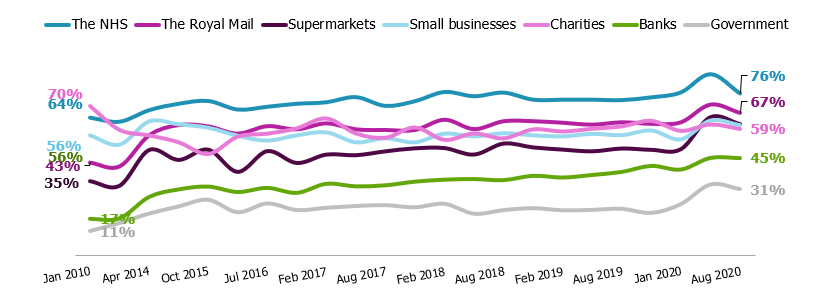The ongoing pandemic has affected every corner of public life in the UK, so it is no surprise that trust in public institutions has undergone major shifts over the past few months. In fact in May of this year we saw many institutions reach their highest score since we began tracking. Trust in the NHS rose nine points to 85% as the public saw the extent to which frontline healthcare workers were relied on in responding to the outbreak. Likewise trust in supermarkets, small businesses and the Royal Mail increased significantly as people realised their role in keeping the country running smoothly. Government, perennially one of the least trusted institutions, also saw a significant increase to reach an all time high in May. Even institutions apparently unrelated to the pandemic such as banks have seen increases in trust among the public.
While several of these institutions have seen a small decline in September, many are still close to their all-time high trust levels for our tracking, including the government, small businesses, supermarkets and the Royal Mail, as shown in the chart below showing trust in selected institutions.

“Please indicate, by ticking in the appropriate column, how much trust you have in each of the bodies.” A great deal + Quite a lot
Source: Charity Awareness Monitor, May 20, nfpSynergy | Base: 1,000 adults 16+, Britain
Charities, however, appear to be the exception. While we might expect to see trust in charities go up as word gets out to the public of the excellent work that charities have been doing throughout the pandemic in ensuring that people remain safe and supported, the trendline has in fact remained frustratingly flat. In November of 2019, trust in charities was at 63%. By May, where most other public institutions had seen a spike, charities were at a lower (albeit statistically insignificantly different) 61%, and just 59% in the most recent wave in August.
So what is behind this? Why has trust in charities not risen in tandem with other vital (and not-so-vital) public institutions? One explanation could simply be that the pandemic response is seen as an issue that is too big for charities and the public struggle to see the role of charities in reacting to the crisis. This is something we have seen before in qualitative research on the subject of climate change, where many donors struggle to make the link between charitable giving and real-life impact on the climate.
However, another, slightly uncomfortable, explanation is simply that the public has not been that impressed with the work of charities during the pandemic so far. Our polling with the general public on the subject of the coronavirus and charities suggests that around half (53%) of the public have been impressed by the response of charities to the pandemic. While we in the sector know the quality of work being done by charities every day in helping society through the panic, our evidence suggests that not enough is being done to communicate this to a public that is overloaded with information about the pandemic.
For all that public trust is not where it might be, there are even more concerning signs when it comes to charities and governmental priorities. Our latest wave of research for our clients suggests that 49% of the public are worried about the financial impact of the pandemic on charities, while 39% are concerned about the impact on arts organisations. Despite this gap, the government has announced additional funding to the arts of about twice what it has given to charities. All of this suggests that there is much work to be done to convince the public and government of the need to support the work of charities at a time when many are faced with existential threats.
With respect, I would argue
With respect, I would argue that the comparison between the arts and charities is a false equivalence. In the first place the arts fall within the category (or at least many organisations within the broad label) of charities. Secondly, the arts as well as some other types of charities are highly dependent for their income on physical attendance at events. This point was a significant point in their case for support from government.
I really enjoyed reading this
I really enjoyed reading this blog. It was explained and structured with perfection.

